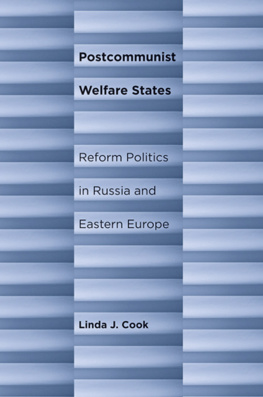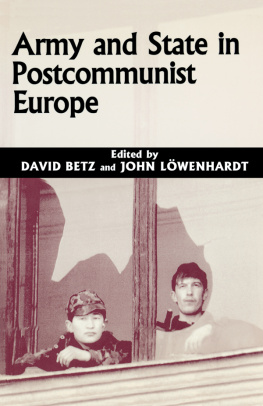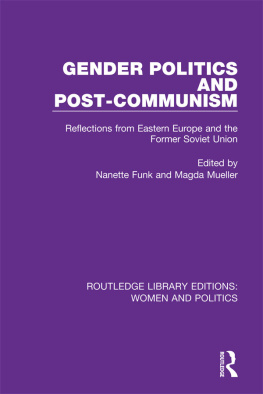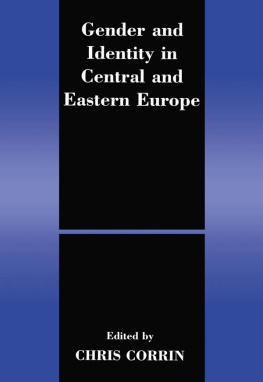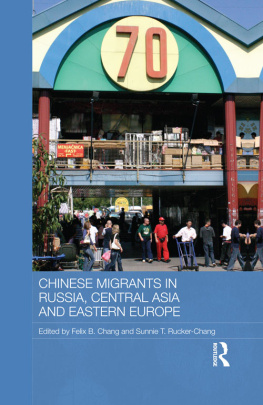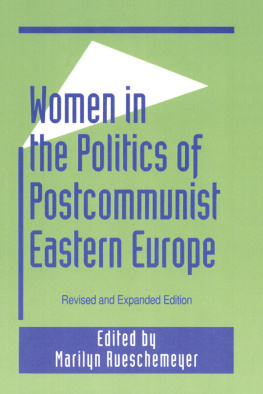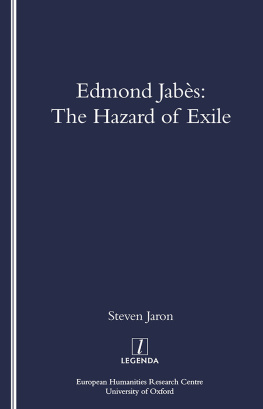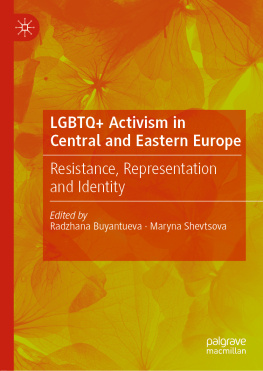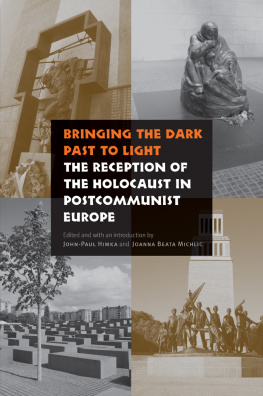Sexuality and Gender in Postcommunist Eastern Europe and Russia
THE HAWORTH PRESS
Human Sexuality
Eli Coleman, PhD
Editor
Tongzhi: Politics of Same-Sex Eroticism in Chinese Societies by Chou Wah-shan
Sexuality and Gender in Postcommunist Eastern Europe and Russia edited by Aleksandar tulhofer and Theo Sandfort
First Published by
The Haworth Press, Inc., 10 Alice Street, Binghamton, NY 13904-1580.
Transferred to Digital Printing 2008 by Routledge
270 Madison Ave, New York NY 10016
2 Park Square, Milton Park, Abingdon, Oxon, OX14 4RN
2005 by The Haworth Press, Inc. All rights reserved. No part of this work may be reproduced or utilized in any form or by any means, electronic or mechanical, including photocopying, microfilm, and recording, or by any information storage and retrieval system, without permission in writing from the publisher.
Cover design by Lora Wiggins.
Cover art by Ozren Pupovac.
Library of Congress Cataloging-in-Publication Data
Sexuality and gender in postcommunist Eastern Europe and Russia / Aleksandar tulhofer and Theo
Sandfort, editors.
p. cm.
Includes bibliographical references and index.
ISBN 0-7890-2293-1 (alk. paper)ISBN 0-7890-2294-X (soft : alk. paper)
1. SexEurope, Eastern. 2. SexEurope, Central. 3. SexFormer Soviet republics. 4. Gender
identityEurope, Eastern. 5. Gender identityEurope, Central. 6. Gender identityFormer Soviet
republics. 7. Post-communismSocial aspects. I. tulhofer, Aleksandar. II. Sandfort, Theo, 1953
HQ18.E852S49 2004
306.70947dc22
2003024309
Contents
Aleksandar tulhofer
Theo Sandfort
Tatjana uri-Kuzmanovi
Voichita Nachescu
Kevin Moss
Biljana Kai
Igor S. Kon
Tea Nikoli
Tatjana Greif
Alexei Lalo
Nikolai Schitov
Brian James Baer
Donna M. Hughes
Tatiana Osipovich
Natalia Khodyreva
Marianna Supekov
Gabriel Bianchi
Miroslav Popper
Ivan Lukk
Roger Ingham
Ivan Bernik
Valentina Hlebec
Elina Haavio-Mannila
Anna Rotkirch
Osmo Kontula
Miroslav Popper
Gabriel Bianchi
Ivan Lukk
Marianna Supekov
Roger Ingham
Aleksandar tulhofer, PhD, is Associate Professor of sociology at the University of Zagreb in Croatia. He teaches sociology of sexuality, the first university-level course on human sexuality to be offered in Croatia, and sociology of culture. He has conducted research and written extensively on adolescent sexuality and risk-taking behavior, sex education, gender, intergenerational differences in sexual behavior, sexual health, and attitudes toward sexuality. Dr. tulhofer is the author of The Invisible Hand of Transition and Trafficking in Women and Children for Sexual Exploitation .
Theo Sandfort, PhD, is President of the International Academy of Sex Research and Associate Professor at the HIV Center of the New York State Psychiatric Institute and the Department of Sociomedical Sciences of the Mailman School of Public Health at Columbia University in New York. Dr. Sandfort was trained as a social psychologist and his research interests center on sexual health, homosexuality, and sexual development. He serves on the board of various academic journals dealing with sexuality, including AIDS Care, Archives of Sexual Behavior, Culture, Health and Sexuality, Journal of Gay & Lesbian Psychotherapy, Journal of Homosexuality, Journal of Psychology & Human Sexuality, and Sexualities. He is co-editor of Childhood Sexuality: Normal Sexual Behavior and Development (Haworth).
Brian James Baer, PhD, is Assistant Professor of Russian language, literature, and translation studies at Kent State University. He is presently completing a book with the working title Other Russias: Reading Homosexuality in Post-Soviet Culture that explores the meaning of homosexuality in contemporary Russia.
Ivan Bernik, PhD, is Professor of sociology at the Faculty of Social Sciences, University of Ljubljana, Slovenia. His areas of interest include postsocialist societies, especially political culture, acceptance of democracy and changes in social stratification, and sexual behavior of adolescents. His publications include numerous articles in journals and books and two monographs in Slovene ( Exploitation and Consensus in Socialist Societies, published in 1992, and Double Disenchantment of Politics, published in 1997).
Gabriel Bianchi, PhD, is a senior research fellow and director of the Department of Social and Biological Communication of the Slovak Academy of Sciences in Bratislava, Slovakia. Since 1993 he has been working in health-related psychological research, focusing on social representations of AIDS, sexual risk, sexual satisfaction, social and cultural contexts of sexual conduct, and gender constructionmainly in young people. From 1998 to 2000 he was principal investigator for a WHO/UNAIDS Rapid Assessment and Response project targeting sexual health and substance use interaction in the Slovak military. Dr. Bianchi teaches sexual health courses at the Comenius University, Bratislava, and supervises doctoral theses in this field, organizes conferences with international participation on sexual education and sexual health, and organizes and teaches training courses and workshops in the area of sexual education and HIV prevention for teachers and nurses. He participated in the expert committee for the national preventive campaign STOP AIDS (1994-1995).
Tatjana uri-Kuzmanovi obtained her PhD in economics at the University of Belgrade in 1992. She is Professor at the Advanced School of Business, Novi Sad, Serbia and Montenegro. She has published widely in national and international journals. Her research interests include gender and economy, economies in transition, development economics, poverty, employment, economic policy, and economic aspects of nationalism. She was a member of the editorial committee of the journal Ekonomist, Belgrade, and Director of the Center for Documentation, Publishing, and Research on Youth (CIDID), Belgrade. She is a member of SID (Society for International Development) and IAFE (International Association of Feminist Economists).
Tatjana Greif holds an MA in archaeology and is a PhD candidate in Gender Archaeology at the University of Ljubljana. She became involved in LGBT activism in the early 1990s. She is currently working as a program manager of the Slovenian lesbian group KUC-LL . She is involved in various educational and antihomophobic projects, gay and lesbian studies, political activism (same-sex partnership law), journalism, and gay and lesbian human and civil rights promotion. Greif is also a member of several editorial boards ( Arheo, Lesbo, Vizibilija, Delta, Lezbomanija, and Journal for the Critique of Science ). Since 1998 she has served as a member of the executive board of ILGA-Europe. Currently she is a board member of Slovene Centre of NGOs and the Slovenian NGO representative in the European Economic and Social Committee.
Elina Haavio-Mannila, PhD, is Professor Emeritus of sociology at the University of Helsinki, Finland. She has conducted research in the fields of gender roles in the family, working life, politics, and sexuality. She is especially interested in cross-cultural comparisons. Recent publications in English include Sexual Lifestyles in the Twentieth Century (2002), Sexual Pleasures (1995), and Womens Voices in Russia Today (1996).



